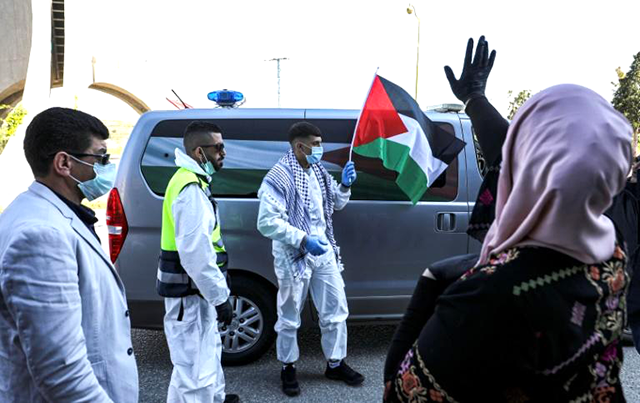- International News
- Tue-2020-04-28 | 03:37 pm

After a moment his father pushed away the 18-year-old, who was wearing a face mask, plastic suit and gloves.
Naji briefly waved to other family members in the city of Ramallah in the occupied West Bank before being hurried to a nearby hotel for two weeks of isolation alongside other released prisoners.
Israel's response to the coronavirus pandemic has included efforts to prevent outbreaks in prisons, including regular sterilisation, checking temperatures of staff daily, and stopping visits from family and lawyers.
But advocates are calling for more -- urging the Jewish state to release at-risk prisoners.
More than 5,000 Palestinians are currently detained in Israeli jails.
So far Israel says no cases have been detected among inmates.
But the Palestinians said one released prisoner was infected and the justice ministry has called for an investigation.
The International Committee of the Red Cross urged for those over 65 or with health conditions to be released.
"Those measures are meant to reduce the number of detainees and to limit the potential exposure for the most vulnerable," said David Quesne, head of the ICRC's mission in Jerusalem.
"We would like them released to the extent possible and if not then removed from the risk."
Pain has 'multiplied'
Israel has nearly 15,000 COVID-19 cases, while in the Palestinian territories around 350 have been reported, though testing rates are lower.
Palestinians are fearful that the disease will be brought into the West Bank by Palestinians returning from Israel, including the tens of thousands who work in Israel and those released from prisons.
Naji, who was jailed for a year after being accused of throwing stones at soldiers during a protest, was not released due to coronavirus but because his term ended.
He said there was real fear of an outbreak in the prisons.
"Life for prisoners in Israeli prisons is tough, but after the spread of corona[virus] their pain multiplied," said Naji, who holds American and Palestinian citizenship.
The Palestinian Prisoners' Club, a Ramallah-based NGO, said dozens of prisoners had been released since the coronavirus arrived in Israel.
Like Naji, they were all tested after being released and sent to quarantine, said the NGO's Amani Sarahneh.
She said one released prisoner, who had been detained for just four days, later tested positive for the virus.
Israel poured scorn on the claim, saying the man was healthy when he exited the prison.
The Israeli Prisons Service told AFP it had "prepared for months to prevent the entry and spread of the coronavirus in its facilities."
Each prisoner was given two multi-use facemasks and new prisoners are isolated for 14 days, it said, condemning what it called "false reports" in Palestinian media and elsewhere.













